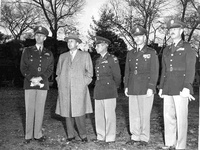
Graduates of the Class of 1953 process into the Yard during Commencement exercises after a spring filled with friends shipped off to Korea and scandal over accusations of communists at Harvard.
War broke out just after the members of the Class of 1953 finished their first years at Harvard, and it dragged on until just after they graduated.
“My image of warfare was hardly romantic,” says James M. Storey ’53, a history and literature concentrator who did not serve in the war, and did not enroll in the Reserve Officer Training Corps. “My brother was killed in World War II. So I began my life knowing about the bad things in war.”
“When I talked to people who were coming home from the Korean war, all of that was confirmed,” he adds.
But despite the generation’s intimate knowledge of the horrors of war, for those three long years, most remember little debate in dining halls and classrooms about the war’s purpose, save the protests of one or two left-wing groups like the Young Progressives.
Despite Harvard’s leftist reputation, many members of the Class of 1953 say they felt generally in line with the rest of America on the question of the Korean conflict.
And many remember thinking that the war was necessary to stem the spread of communism in Asia.
“It was a challenge. And Harvard was a challenge. It was consistent that those of us who were in college, especially in Harvard, that it was particularly incumbent upon us—those chosen few among the many that applied—to do what was expected of us,” says Robert L. Consolini ’53-’56, who took two years off from college to serve in the army.
“We weren’t looking for approbation from our peers, we were looking for a sense of being at ease with ourselves,” he adds.
Students received deferrals from fighting until they graduated, although some—like Consolini—chose to leave Harvard and join the armed forces. One member of the Class of 1953 was declared missing in action during the war, according to University archives.
The war began in 1950 when North Korea attacked South Korea and—with U.N. authorization—the United States sent in troops to reinforce the South. The conflict was widely seen as not only about protecting Korea, but about containing the emerging communist powers, the Soviet Union, which was believed to have been aiding the North, and China, which joined the side of the North in October of 1950.
By the time the student deferrals of the Class of 1953 neared expiration, the war had degenerated into stalemate along the 38th parallel, which formed the original boundary between the North and South. By mid-summer after the Class of 1953 graduated, both sides had signed an armistice.
But the Korean War—often called the “forgotten war,” since Vietnam and World War II are generally better remembered—was a complicated issue for the Class of 1953.
The Allies had won World War II less than a decade before, and that well-celebrated triumph—as well as the United States’ new position as a global superpower—contributed to the generation’s sense of loyalty to the United States’ foreign policy.
But the nearness of World War II also meant that members of the Class of 1953 knew many veterans—and many stories about the war—and so did not hold many illusions about the grim reality of combat.
“It was not a time when people would refuse to serve or go to Canada to get out of it,” says Walter Greeley ’53, who was first marshal of the class.
Read more in News
Sikh’s Sword Seized By School













